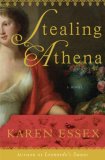Write your own review!
Mary Ann
Women in History
I enjoyed this book on two levels. The first, for the parallel stories of two men trying to create history, and the second for two women who are taken along for the ride.
This story has many discussion points for women's roles, men's roles and how they play out throughout history. I think book clubs would like it.
 Doris
Stealing Athena
Doris
Stealing Athena
I enjoyed this book which is based on the life of Mary Nisbet, countess of Elgin. The author skillfully compared Mary's life to Aspasia of ancient Athens.
This story led me to reread some of the history of Greece which is a mark of good historical fiction. I think it would lead to a good discussion in a women's book group.
Linda
Bogged Down in Details
I am a huge fan of historical fiction, so I was really looking forward to this book. Unfortunately I struggled with this book for over a month. Some of the passages were so detailed I lost interest in the point of the chapter. I found the story of Mary and Robert Elgin more engrossing than the Aspasia/Perikles story set in Ancient Greece, but in general didn't care very much for most of the characters in the two stories, they just didn't 'feel' like flesh and blood people to me. I usually enjoy reading books that have stories set in two different eras, but the back and forth in this book was often jarring. Although I wouldn't consider this a bad book, I was disappointed in it.
Sharon
History Book with Dialogue
This is a novel about the removal of classic sculpture and art from the Greek Parthenon in the early nineteenth century. Lord and Lady Elgin, while serving as ambassadors to the Ottoman Empire, excavated and removed dozens of pieces and shipped them to England to save them from further deterioration and ruin. They are still displayed in British museums and are known as the Elgin Marbles.
Although the book is very informative, switching back and forth in time between the original building of the Parthenon and design of the sculptures to their later removal, it made for tedious reading. None of the characters are very likable. Information about the marbles found on the Internet was much more interesting and easier to read.
Jeanne
Could have been better
The story is interesting especially as it pertains to the lack of legal rights for women throughout history and the issues of removing antiquities from a country for personal gain. The book moves slowly in the beginning and the pace doesn't really pick up until the halfway point. The narrative is choppy in places as it moves between the Athens of 450 BC and early 19th century Turkey, Greece and Europe and the writing seems careless. The character of Mary Elgin seems fairly well fleshed out but Aspasia doesn't quite ring true.
Liz
Not very engaging
I did enjoy the historical fiction and the time period changes in this book, but it seemed to drag on and on. I liked the characters but found my thoughts wandering away from the story when I was reading.
jeana
Stealing Athena
I had been eager to learn more about those famous "Elgin" marbles; however, I found the tone of the book inconsistent and its writing style rather a distraction, beginning on page 7 when Lord Elgin tells the expectant Lady E. to go below decks at the threat of a naval battle, and she responds, "Not a chance, Your Lordship" -- in 1799! Just a few pages later, the author tells us that the lady's pregnancy causes her to feel so sleepy that she nearly nods off during a 19-round cannon salute!
Nevertheless, Lady Elgin was truly remarkable, and her story should be more widely known. The author's device of relating her history in tandem with that of Aspasia, the consort of Pericles, was a good one. There are many parallels, including the countless gifts and virtues each woman is credited with.
Upon finishing this book, I followed the author's suggestion to read more abut Lady E, in the recent biography by Susan Nagel.
Deanna
A Bit of a Disappointment
I have always been fascinated by the "story" of the Elgin Marbles and how they came to the British Museum. However, the parallel stories of Aspasia {written in 1st person} and Mary Nisbet, Lady Elgin {written in 3rd person} did not engage my interest enough for me to truly enjoy this book. I learned a great deal about Napoleonic times, small pox vaccine and ancient Greece but it was a difficult task.




